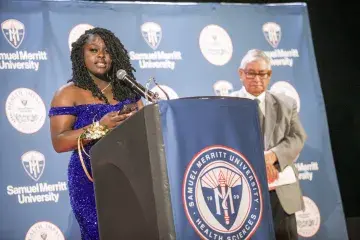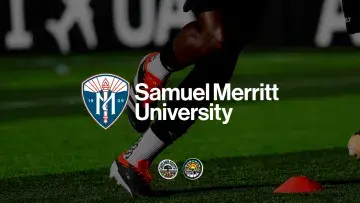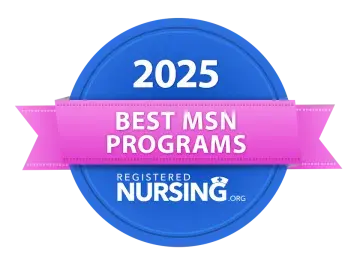SMU’s First FNP Online Cohort Graduates
Alejandra Villegas stepped onto the Samuel Merritt University (SMU) campus in Oakland for the first time Saturday afternoon and took a good long look around.
“It’s really nice here,” Villegas said just before attending a graduation ceremony in the Health Education Center to receive her master’s degree as a family nurse practitioner. “I would have come here more often if I knew it was so welcoming.”
Villegas was among a unique graduating class at SMU: The first cohort to complete their FNP master’s degree entirely online.
Along with 24 other graduates from all across California, Villegas started the inaugural program 18 months ago from their computers at home. They also completed 630 clinical hours in their respective hometowns.
“In less than two years, my family has a better life,” said Villegas, who was joined on her trip from El Centro, near the U.S.-Mexico border, by her husband and two young children. “It was a fast program and I spent many nights studying after the kids went to bed, but now I’ve got a lot to show for it: A new career.”
Indeed, SMU’s online program has grown rapidly since Villegas signed up and the job prospects for FNPs have increased as well. Since early 2015, when SMU’s inaugural class logged on, there are now 225 online students enrolled in nursing degree programs from six different states. And according to the U.S. Bureau of Labor Statistics, the number of family nurse practitioners (215,000) is expected to grow 19 percent by 2020, far above the national average. U.S. News & World Report also ranked the profession as the sixth best job overall in 2016.
Nurse practitioners serve as primary and acute care providers. They make diagnoses, initiate and manage treatment, prescribe medications, and counsel patients, their families, and communities.
“In many ways these graduating students are pioneers,” said Ellie Hoffman, director of online nursing programs at SMU. “They were the first to do it entirely online. But in other ways, it’s the same content, the same excellent faculty, and the same clinical experience as someone who attended school here on campus.”
The scene at the graduation was the first time many students and faculty met each other in real life after spending countless hours on discussion boards, in emails and phone calls, and through texts.
Angela Torgerson, the online student success manager based in Mesa, Arizona, attended the ceremony to help celebrate with the students she’d only known in digital format. Torgerson served as the liaison between students and faculty, and clinical coordinators, to make sure the online education experience was as responsive as the real-life campus experience.
“It’s giving me a warm and fuzzy feeling today,” Torgerson said. “I’ve recognized a few voices.”
Inside the Health Education Center, Villegas recalled she heard about the online program from a fellow registered nurse at the clinic she worked at in Southern California. She said at first she did not believe such an online program existed, and thought she would have to wait until her then-1-year-old daughter was older before she could return to a college campus for her master’s degree.
“Everybody (RNs) seems to be in the same boat,” Villegas said. “They want to go back to school but they think their kids need to be older, but it’s not the case. You can put them to bed, then get your studying in, and continue to work the next day.”
In fact, just months into her SMU online degree program, Villegas learned she was pregnant with her second child, Robert Alexander, now one month old.
“If I got pregnant while I was at another school on campus I might have to drop out,” Villegas said. “Now, I’ve got two children, my nurse practitioner degree, and I get to go back to work and I’ll be the one making the decisions.”


